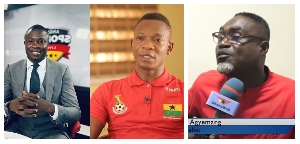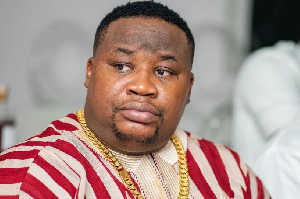General News of Tuesday, 16 December 2003
Source: ADM
Justice Abban Was On Acheampong's Death List
The late Chief Justice, I.K Abban was nearly assassinated by a former head of state, Gen. I.K Acheampong in 1978.
Speaking at the National Reconciliation Commission (NRC) yesterday, a civil rights activist, Mr. Kwame Appiah Boateng said Justice Abban disclosed this to him in a letter, which he tendered at the Commission.
Mr. Boateng said Justice Abban who was then the Electoral Commissioner was coerced by Acheampong's regime to rig the elections during the UNIGOV period when he (Acheampong) realized that he was losing.
He said the late Justice Abban refused to comply with the directive and became an enemy of the regime. He said Justice Abban told him he was trailed on several occasions to be assassinated by state security operatives but survived.
He said Abban informed him that his suspicion that the regime wanted to eliminate him heightened when he survived a motor accident with a military vehicle.
He said Justice Abban told him he went into hiding at an archbishop's house until tempers calmed down. Mr. Boateng who lives in Los Angeles, USA told the Commission that he petitioned them on an incident which happened to him in 1978 concerning a soldier who manhandled him without any provocation.
He said the soldier beat him with the butt of a gun after he had gone to register as a member of the People's Movement for Freedom and Justice at Kumasi.
He said he had another brush with a soldier who molested traders in 1978. Mr. Boateng said he confronted the soldier for unlawfully seizing the wares of market women and later sold them for his personal gain.
He said the soldier punched him and went to ransack the store of his grandmother. He said the soldiers came looking for him the following day but couldn't see him.
Mr. Boateng said a man bearing his name was mistaken for him and beaten up by the soldiers.
Hearing continues today.
'Operation Guitar-Boy' At NRC
A member of the Council of State, who was also a one-time Inspector-General of Police, Mr. A.K. Deku came to yesterday's sitting of the National Reconciliation Commission, NRC, to defend his integrity after been accused of leading a team which brutalized an attempted coup-maker in 1967.One of the officers who took part in Ghana's first attempt at unseating a military regime, had accused him of being responsible for the atrocities meted out on him after the botched coup attempt of 1967.
Although the Council of State member, who served also as a member of the National Liberation Council, NLC, did not utter a word as he sat looking at the former military officer accusing him of using a pen to direct the physical tortures which was inflicted on him at the Police Headquarters, his counsel did the cross examination.
As a result of the brutalities he told the commission that he now has an impaired sense of hearing. Lt. Ebenezer Poku-Osei(rtd) was part of the 'Guitar-Boy' coup attempt of 1967 and he told the commission that although the Late Lt. Arthur used the principle of deception to get him along with the coup attempt he would have opted out of action had he known he was being deceived.
Lt. Arthur had told them that the whole Ghana Armed Forces was staging a coup and he was asked to secure the Castle which he did after losing some of his men.
After a while he told the commission the coup was foiled and Col Bernasko and another officer came over to ask him to come over to 2 BN which he obliged.
He was however upon arrival put under arrest and detained at Ussher Fort Prison and his seniors, Lt Arthur and Lt. Yeboah were sentenced to death by firing squad. While in prison he recalled how Arthur told them how he was the originator of the whole thing and Yeboah retorted that he would have finished him had he known that earlier.
He tried to defend their action of that fateful day during which Gen Kotoka, Capt Avevor, Buckloe and others lost their lives by stating that various constitutions of the country state that it was lawful to resist coups and that theirs was an attempt at removing a regime which had assumed power by overthrowing a constitutionally elected government.
He expressed angst at the manner in which Ghanaians detest coup makers as if they do not belong to this country.
When he secured a job at the State Transport Corporation he told the commission, that the personnel manager wrote to the Castle seeking their advice as to what to do with a coupmaker who was in their employment. Eventually he said he was kicked out of the place and the military too instead of offering him something to start life afresh with just dumped him to ' go and eat grass' but however re-engage the soldiers who took part in the coup.
He said he did not bear any grudge against the authorities for their action in re-instating the soldiers but he too should have been given something as stated above.
One of the commissioners however told him that he should count himself lucky since after all Arthur and Yeboah were executed.
He added that Ghanaians have not been sensitized enough about the need to resist all coups.
Lt. Poku-Osei had at the time of the coup just served six months after receiving his commission and his superiors Arthur and Yeboah had done some three or so years.
General Erskine, in the light of the above observed that it was improper to bestow a powerful unit like the RECCE squadron in the hands of very young officers like the late Lt. S.B. Arthur and Lt. Yeboah and hoped lessons would be learnt from what happened at that time.
Mr. Deku's counsel said it was not his client who headed the interrogation team at the time that the former officer was arrested adding that the questioning was not done at the Police headquarters but at the Special Headquarters.
Lt. Poku-Osei stood his ground that it was the council of state member and that he knew him even before he was brought before him.












